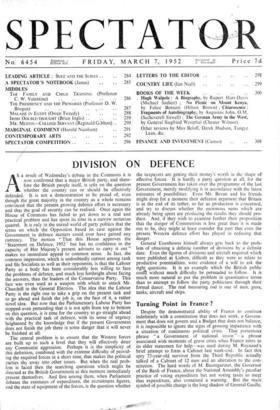DIVISION ON DEFENCE
ASa result of Wednesday's debate in the Commons it is now confirmed that a major British party, and there- fore the British people itself, is split on the question whether the country can or should be effectively defended. It is not a demonstration to be proud of, even though the great majority in the country as a whole remains convinced that the present growing defence effort is necessary and that the goal of security can be realised. Once again the House of Commons has failed to get down to a real and practical problem and has spent its time in a narrow sectarian quarrel. It is only in the unreal world of party politics that the terms on which the Opposition based its case against the Government in defence matters could ever have gained any currency. The motion " That this House approves the ' Statement on Defence, 1952 ' but has no confidence in the capacity of Her Majesty's present advisers to carry it out " makes no immediate appeal to common sense. In fact, the common impression, which is undoubtedly current among rank and file Socialists as well as their opponents, is that the Labour Party as a body has been considerably less willing to face the problems of defence, and much less forthright about facing the answers, than the leaders of the Conservative Party. This fact was even used as a weapon with which to attack Mr. Churchill in the General Election. The idea that the Labour Party is the right one to take a grip on the present task and to go ahead and finish the job is, on the face of it, a rather novel idea. But now that the Parliamentary Labour Party has stopped even pretending that it is not split from top to bottom on this question, it is time for the country to go straight ahead with the practical task of defence, with its sense of urgency heightened by the knowledge that if the present Government does not finish the job there is some danger that it will never be finished at all.
The central problem is to ensure that the Western forces are built up to such a level that they will effectively deter any Communist aggression. Perhaps it is the simplicity of this definition, combined with the extreme difficulty of provid- ing the required forces in a short time, that makes the political parties shy away into other issues. But when the real prob- lem is faced then the searching qUestions which might be directed at the British Government at this moment immediately present themselves. And first among them, when Parliament debates the estimates of expenditure, the recruitment figures, and the state of equipment of the forces, is the question whether the taxpayers are getting their money's worth in the shape of effective forces. It is hardly a party question at all, for the present Government has taken over the programme of the last Government, merely modifying it in accordance with the latest estimates of possibilities. Even Mr. Bevan and his friends might drop for a moment their defeatist argument that Britain is at the end of its tether, so far as production is concerned, and try to discuss whether the enormous sums which are already being spent are producing the results they should pro- duce. And, if they wish to examine further their proposition that the danger of Communism is less great than it is made out to be, they might at least consider the part that even the present Western defence effort has played in reducing that danger.
General Eisenhower himself always gets back to the prob- lem of obtaining a definite number of divisions by a definite date. Even the figures of divisions and aircraft required which were published at Lisbon, difficult as they were to relate to productive potentialities, were evidence of a will to ask the right questions. It is an example which the British public coula without much difficulty be persuaded to follow. It is much more natural to put the problem in quantitative terms than to attempt to follow the party politicians through their formal dance. The real measuring rod is one of men, guns, tanks, aircraft and ships.


































